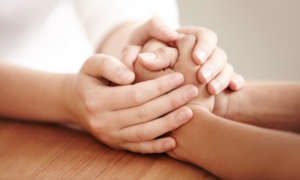You’re a piece of @#$%&! I never want to see your @#$%&! face again! He smashed the plate of spaghetti to the floor. Now go clean it up!
For a number of years I was in an abusive relationship with someone I’ll simply call “B.” B was the life of the party: charming, gregarious, and, behind closed doors, abusive.
He was handsome, dashing and, as they say, the life of the party. But out of sight of anyone else, and out of earshot, he would descend into a dark place fueled by too much Jack Daniels and the weight of life stresses. He’d set off like a bomb at the slightest perceived slight and explode in a fit of anger, sending shrapnel my way.
After the storm subsided, any attempt I would make to talk about it was met with a cool, “Why do you have to make things so complicated” or “You need to chill, lady.” He was emotionally unavailable. Somehow, things were never his fault. He would eventually brighten, though, and things would go back to a kind of normal—for a while.
One day, in a sunnier mood, he casually said, “We should get married.” My heart stopped. I knew at the deepest level then that I had to get out. In retrospect, from the beginning, there should have been clear-cut signs to leave, but the relationship turned into messy confusion and a protracted struggle. Verbal assaults had turned physical. A push into a wall. A threat to throw me out a window. A hand raised to slap. Although I eventually ended the relationship, at the time, it was very hard to swallow. Could this really be happening to me? I wondered. Wasn’t this something that happened to other people? And what if I had been married to him? What would I do?
Could domestic violence happen to any of us? Could it happen to you?
Marriage and domestic violence—all too common
The American Association for Marriage and Family Therapy (AAMFT) states that “in almost 20% of all marriages, couples slap, shove, hit, or otherwise assault each other. Emotional abuse—verbal threats, humiliating or degrading remarks, and controlling behavior—is even more common.”
(AAMFT) states that “in almost 20% of all marriages, couples slap, shove, hit, or otherwise assault each other. Emotional abuse—verbal threats, humiliating or degrading remarks, and controlling behavior—is even more common.”
Red flags of an abusive relationship
The National Domestic Violence Hotline website states that many abusive partners “seem absolutely perfect in the early stages of a relationship”; however, possessive and controlling behaviors don’t always appear overnight, but rather emerge and intensify as the relationship grows. The following behaviors may indicate you are in an abusive relationship, if your partner is:
- Telling you that you can never do anything right
- Showing jealousy of your friends and time spent away
- Keeping you or discouraging you from seeing friends or family members
- Embarrassing or shaming you with put-downs
- Controlling every penny spent in the household
- Looking at you or acting in ways that scare you
- Controlling who you see, where you go, or what you do
- Preventing you from making your own decisions
- Telling you that you are a bad parent or threatening to harm or take away your children
- Preventing you from working or attending school
- Destroying your property or threatening to hurt or kill your pets
- Pressuring you to have sex or to do things sexually you’re not comfortable with
- Pressuring you to use drugs or alcohol
If you are experiencing any of the above, you may need to seek help.
Getting help
 The AAMFT stresses that domestic violence is a crime; your first response needs to be to protect yourself and your children. Therefore, you may need to call the police. Most communities have victim support services and access to shelters where you and your children can go if you are afraid. Additionally, a call to the local Battered Women’s Shelter Organization, community crisis line, or community mental health agency can provide a list of available services. Shelters will not divulge your identity; they actively seek to protect the identity of those in refuge.
The AAMFT stresses that domestic violence is a crime; your first response needs to be to protect yourself and your children. Therefore, you may need to call the police. Most communities have victim support services and access to shelters where you and your children can go if you are afraid. Additionally, a call to the local Battered Women’s Shelter Organization, community crisis line, or community mental health agency can provide a list of available services. Shelters will not divulge your identity; they actively seek to protect the identity of those in refuge.
If the violence has not escalated to the point that you are fearful, but you or your partner recognize that the way you argue is not healthy and want to prevent destructive arguing from destroying your marriage or escalating to battering, the AAMFT notes that marital therapists can give couples “tools to eliminate violence, resolve conflict, and improve marital relationships.”
An insidious path
The impacts abuse also has on mental health are many. Domestic violence victims face depression, anxiety and other emotional distress aside from physical dangers. If you—or someone you know—feel afraid or in danger, do not hesitate to immediately seek help.
The National Domestic Violence Hotline has trained advocates available 24/7to take calls at the toll-free number: 1-800-799-SAFE (7233).


1 Comment
Relationship advice
Hello,
How to increase the sexual stamina, one of the most common question asked by men. Gone those days when sex was just about pleasure for man, but now days have been changed and every women demand same pleasure from men.